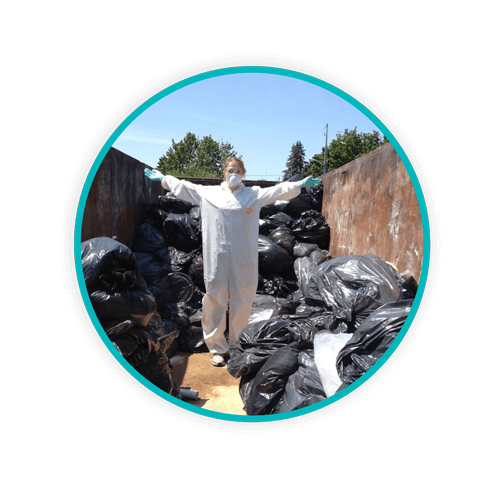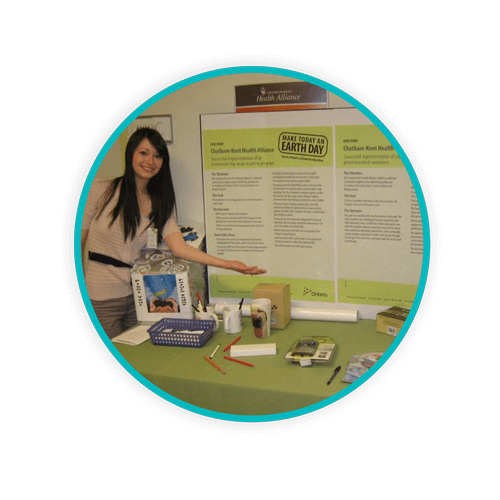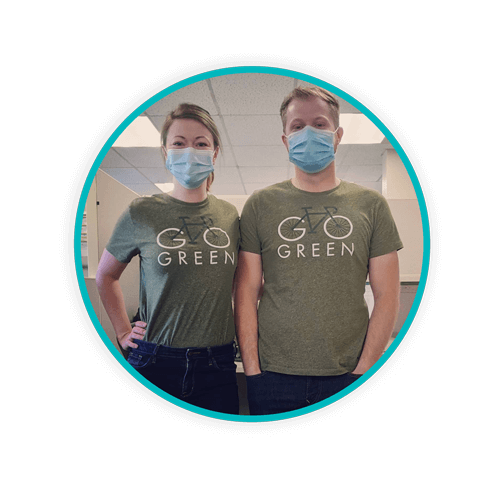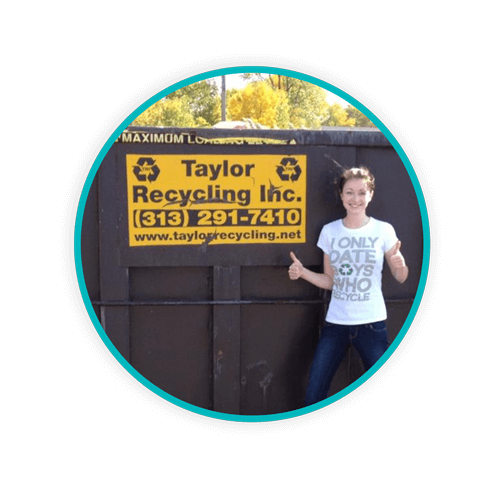Spotlighting Hospital Waste Sustainability with Taylor Maris

“I have a weird passion for hospital waste. It’s just what I love.”
Taylor Maris, National Manager of Sales Operations-Clinical & Sustainability, has a passion for the environment. So much so that in her free time, she volunteers at her local schools and conducts “Taylor Talks.” Covering topics like recycling, renewable energy, and climate change, Taylor’s most recent talk to her local 3rd graders featured 51 classes and over 1,000 students in attendance. Her main message to the children is this: Everything comes from the Earth, and the less we pull from the Earth, the better. 
This basic idea is the foundation of sustainability, something that first intrigued Taylor during her undergraduate studies. While working in the day surgery department in her local hospital, Taylor noticed hundreds of ginger ale bottles (a common anti-nausea remedy) were being discarded in the trash and not the recycling. To address this, she created a recycling program for the department. And just like that, something inside Taylor was born.
“I found myself endlessly fascinated with waste management. I knew that’s what I wanted to do the rest of my life.” said Taylor. Taylor’s day-in day-out passion is not always shared by the people who need it most: healthcare workers.
In the hectic hustle and bustle of hospitals, where the focus is firmly on patient care, it's all too easy for healthcare professionals to overlook something as mundane as where they throw away a pair of gloves. This seemingly small oversight is actually part of a much bigger issue.
Canada's healthcare sector is a significant source of global greenhouse gas emissions, accounting for 4.6% of the pie. This is in large part due to improper waste segregation. Typically, only 10% of hospital waste is biomedical waste, but without proper segregation as much as 50–85% of standard landfill waste is treated as biomedical waste, greatly inflating CO2 emissions – imagine driving a car for 23,750 miles for every metric ton of wrongly categorized waste. This mix-up also hits hospitals financially, costing them ten times more than disposing of waste correctly.
So what needs to change? We need to put waste segregation on healthcare workers' radars. That’s where Taylor Maris, the waste segregation training Guru, steps in.
Destined for Daniels: Taylor’s Journey from Advocate to Ally 
Before joining Daniels in 2023, Taylor worked at a variety of hospitals, focusing on hospital waste management. Each location she went to, she kept seeing a familiar face. Or rather, a familiar medical waste collector. “Every interaction I had with Daniels was great. Despite not working there yet, I was bringing Daniels products to the facilities I worked at because I truly believed in the product,” said Taylor.
Prior to her employment with Daniels, Taylor would guest lecture at Western University in Ontario, painting a picture of what a career in waste management looks like. Following one session in 2023, a young man called her and began to ask her questions about sustainability and the impact of medical waste on the environment. In her answers, she found herself referencing Daniels over and over again, despite not working for the organization.
Upon hanging up, she thought of her time in the London Health Sciences Center in 2019 (prior to the installation of Daniels containers soon after), where she witnessed sharps poking out of containers, needles stuck in the lids, seeing first hand why people get needlestick injuries. And in that moment, in a convergence of sustainability and safety, a lightbulb went off.
“Why don’t I work for Daniels? I love it so much as a customer and I’d love to be a part of it,” said Taylor.
Taylor's Triple Challenge: Scaling Sustainability in Healthcare
Since joining the business in February 2023, Taylor has combined her passion for the environment and hospital waste, spearheading both the training for proper waste segregation and the promotion of our reusable program to minimize medical waste's environmental impact. She educates both our clients and sales representatives, enabling them to share the knowledge further.
Her goal is to help the environment by empowering healthcare workers to segregate their waste correctly. She faces three challenges in reaching this goal:
- Training Scale: “Hospitals don’t train their staff on proper waste segregation. Training is needed by so many organizations, and there’s only one of me.”
- Staff Resistance: “Hospital staff have bigger fish to fry than waste management. They don’t want to be told to do something different without a convincing argument.”
-
Change Implementation: “Healthcare workers don’t take you seriously if you don’t know what you are talking about. If you’re not relating to them, they’re not as receptive.”
Customer-First Conservation: Taylor’s Sustainable Strategy
In order to address these challenges and emphasize the importance of proper waste segregation, Taylor employs a flurry of tactics to reach these healthcare professionals.
Firstly, she appeals to logic. She thinks to herself, what do hospitals want?
To Save Money
Hospitals have tight budgets and are cautious spenders. As previously mentioned, sending waste to an incinerator or autoclave is substantially more expensive than a landfill. In her discussions with representatives she makes this clear, despite it not being financially beneficial to Daniels. “I want people to be able to sort properly, but that means they are sending us less and we’re making less money. I asked Daniels if that was going to be a problem.” said Taylor.
The answer? “A resounding ‘no.’”
Patient Health
The primary objective of a hospital is the health of its patients. However, the surge of carbon emissions due to improper medical waste management leads to lower air quality, hazardous weather changes, rising sea levels and countless more negative health impacts on humanity. “If hospitals want to say truthfully that their priority is patient health and safety, then they can not ignore their environmental impact.” Taylor strengthens her argument for proper waste segregation by creating customized, interactive presentations that feature graspable comparative metrics.
To be Legally compliant
This one is quite simple. Compliance is required by law. If you don’t follow these guidelines, you risk fines and legal issues. Together, these form a simple line of logic: segregating waste helps the environment, saves you money, and it’s illegal not to do it. “It’s a rewarding process because we’re doing what’s right for the environment and our customers,” said Taylor. But for the staff to truly listen, they have to know you understand their day-to-day operations. So Taylor learns them. She has shadowed several hospitals and dozens of different departments; putting in full shifts alongside the staff of ICUs, dialysis clinics, house keepers, oncology staff, endoscopy staff, and many more. Once she grasps their role and pain points, and hears their feedback, she can educate them in proper waste segregation in a personalized manner. This is how she makes her teaching stick.
A Major Hospital's Transformation: Triumph in Waste Segregation 
This is a process Taylor has repeated numerous times, yet there’s no clearer success story than that of a major hospital in Toronto. The audit of this hospital's biomedical waste prior to training raised alarms, prompting the call for Taylor's expertise.
The team equipped the hospital with a set of M64 collectors and provided extensive training.
In the months that followed, a subsequent audit revealed a dramatic improvement. Initially, about 90% of the waste in their biomedical containers was incorrectly segregated. After undergoing the training, this figure was reduced to just 10%.
Customer-First Sustainability: Taylor's Mission for a Greener Tomorrow
Taylor is on a mission to enhance our customer experience. She’s teaming up with the marketing team to record and disperse her training sessions online, saying “Now, I can be everywhere at once for our customers!” By digitizing her expertise, Taylor’s expertise will always be just one click away.
Taylor is also dedicated to providing our Canadian customers with more valuable insights, recognizing an area for improvement in the realm of case studies: "We’re expanding our collection of case studies to better support our customers’ needs with solid, peer-reviewed evidence.” This expanded collection will allow customers to make more effective, research-driven decisions.
Finally, Taylor is passionate about leading Daniels Canada's green initiatives. Following her vision for the Sustainability Team, she notes, "By expanding this team, we're not just talking about sustainability; we're living it, showing our customers our commitment to a healthier planet."
Pride and Passion: Taylor's Journey with Daniels Health 
Taylor loves working for Daniels Health. “The thing I love about Daniels is that EVERYBODY is so good at what they do. Everybody rocks!” Taylor, who has experienced a wide variety of previous roles, said that Daniels is far and away the most incredible and reliable group of people she’s ever worked with. “I think it comes from selling a great product. Something that you can really look at and feel proud of. We can sell it in good conscience, knowing it’s helping our customers and the environment.”
Taylor, each and every day you make healthcare safer, safeguarding patients, staff and the planet. Thank you for pushing us further into this frontier of sustainability. You lead the way, and we’ll follow.
